Unlock the profound meanings behind biblical unction, revealing its sacred role from ancient anointing rituals to modern spiritual practices—discover why it matters.

What Does Unction Mean in the Bible
Imagine stepping into a dimly lit room, where the air carries the weight of ancient secrets and sacred whispers. You're about to uncover the layers behind the term 'unction' in the Bible, a concept deeply woven into the fabric of biblical texts.
This term, often associated with anointing and the Holy Spirit, holds a treasure trove of symbolism, spiritual significance, and historical context that extends from the Old Testament's rituals to the New Testament's teachings.
As you explore its multifaceted role, including its connection to healing and modern-day experiences, you'll uncover insights that may shift your understanding of spiritual practices. Why does this matter, and how does it influence contemporary faith?
Key Takeaways
- Unction in the Bible symbolizes sanctification, divine approval, and the setting apart for sacred purposes through anointing rituals.
- It signifies empowerment by the Holy Spirit, enabling believers to perform signs, wonders, and serve with charismatic gifts.
- Anointing reflects God's favor and endorsement, often seen in the consecration of kings, prophets, and items for worship.
- In the New Testament, unction marks believers for a Spirit-empowered life, emphasizing healing, divine grace, and the spread of the Gospel.
Historical Context of Unction
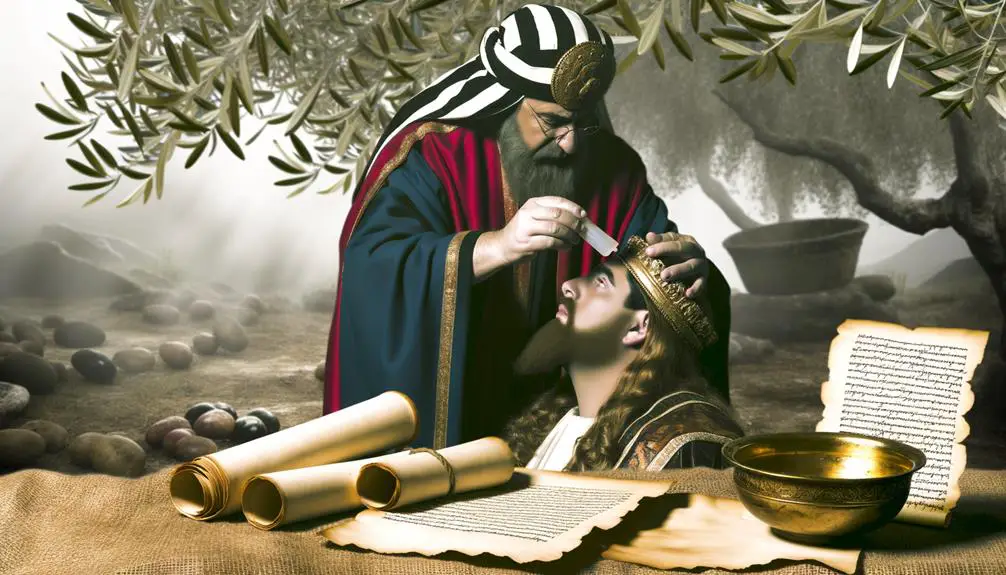
To grasp the concept of unction within the biblical narrative, it's essential to dive into its historical context, where its significance was deeply rooted in ancient religious practices. You'll find that unction, or the act of anointing, was a multifaceted ritual steeped in cultural practices that transcended mere ceremonial tradition. It served as a tangible expression of sanctification, consecration, and divine approval.
The anointing materials themselves held profound symbolic value. Olive oil, often infused with spices and fragrances, wasn't chosen at random. Its abundance and qualities of purification, healing, and illumination made it an ideal candidate for such a sacred act. This choice reflects a deep understanding of the natural world's connection to spiritual realities, a common thread in the tapestry of ancient cultural practices.
Moreover, the process of anointing wasn't arbitrary. It was a deliberate act, performed by prophets, priests, or kings, signifying a person's or object's set-apart status for a divine purpose. This ritual encapsulated the essence of unction, embedding it within the social and religious fabric of the time. It's clear that the historical context of unction isn't merely a backdrop but a crucial lens through which to understand its significance.
Unction and the Holy Spirit
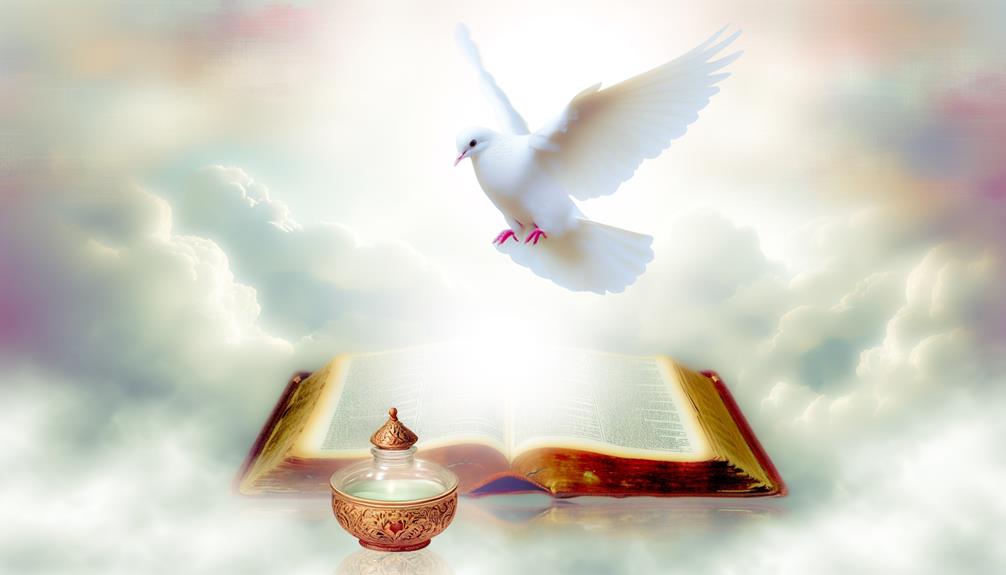
In the biblical context, unction signifies a profound intersection between the divine and the human, primarily mediated through the Holy Spirit's empowering presence. This sacred anointing marks believers for service, imbuing them with the Holy Spirit's power for various ministries and witness. The concept of unction, therefore, isn't merely symbolic but serves as a conduit for the charismatic gifts and the Spirit's active work in the world.
The significance of Pentecost can't be overstated in this discussion. It marks the fulfillment of Jesus' promise to send the Holy Spirit, empowering the early church's members with gifts that were both diverse and essential for the growth and edification of the Christian community. These gifts, often referred to as charismatic gifts, include prophecy, healing, speaking in tongues, and interpretation of tongues, among others. They're seen as concrete manifestations of the Holy Spirit's presence and power, facilitated through the act of unction.
To keep you engaged and interested, consider the following points:
- The role of the Holy Spirit in enabling believers to perform signs and wonders, underscoring the Pentecost significance.
- How unction serves as the believer's initiation into a life led and empowered by the Spirit, marking a departure from mere ritual to a lived experience of God's power.
- The diversity of the charismatic gifts, highlighting the Holy Spirit's multifaceted work in the church and individual believers, fostering unity and edification.
Understanding unction in the context of the Holy Spirit's work invites a deeper appreciation for its role in the believer's life, emphasizing not just a one-time event but a continual empowerment for Christian living and witness.
Symbolism in Biblical Anointing

You'll find that anointing in the Bible carries profound symbolism, notably signifying divine approval and the significance of healing power.
This act not only affirms God's choice but also imbues the anointed with spiritual strength and sanctification, setting them apart for sacred purposes.
Through this lens, we can better understand the multifaceted role of unction in biblical narratives and its implications for the faithful.
Anointing's Divine Approval
Within biblical narratives, anointing often symbolizes divine approval, marking individuals or objects as consecrated and chosen by God for a specific purpose. This act not only signifies sanctification but also serves as a public declaration of God's favor and intention for the anointed. The implications of such a divine endorsement are profound, especially in the contexts of a king's coronation and a prophet's endorsement.
- King's Coronation: Anointing at a coronation ceremony underscores the divine right and authority bestowed upon a king, affirming his role as God's chosen leader.
- Prophet's Endorsement: Through anointing, prophets receive God's endorsement, empowering them to speak and act with divine authority.
- Consecration of Objects: Items anointed in religious ceremonies are set apart for sacred purposes, reflecting their importance in worship and divine service.
This symbolic act of anointing encapsulates a multifaceted gesture of divine approval, consecration, and empowerment.
Healing Power Significance
Beyond its role in consecration and divine approval, biblical anointing also embodies a profound symbolism of healing power, reflecting its ability to restore and rejuvenate both spiritually and physically. This emblematic significance transcends mere ritual, resonating deeply within various cultures and eras.
Through modern interpretations, you'll find that the essence of anointing's healing power remains a cornerstone, albeit expressed with nuanced cultural variations. These interpretations offer a lens through which the timeless nature of anointing's restorative symbolism is viewed, highlighting its adaptability and enduring relevance.
Analyzing this aspect, it's clear that the symbolism of healing embedded in biblical anointing isn't static; it evolves, adapting to contemporary contexts while retaining its foundational significance. This dynamic nature invites a deeper understanding of its role across different cultural landscapes.
Unction in Old Testament Rituals
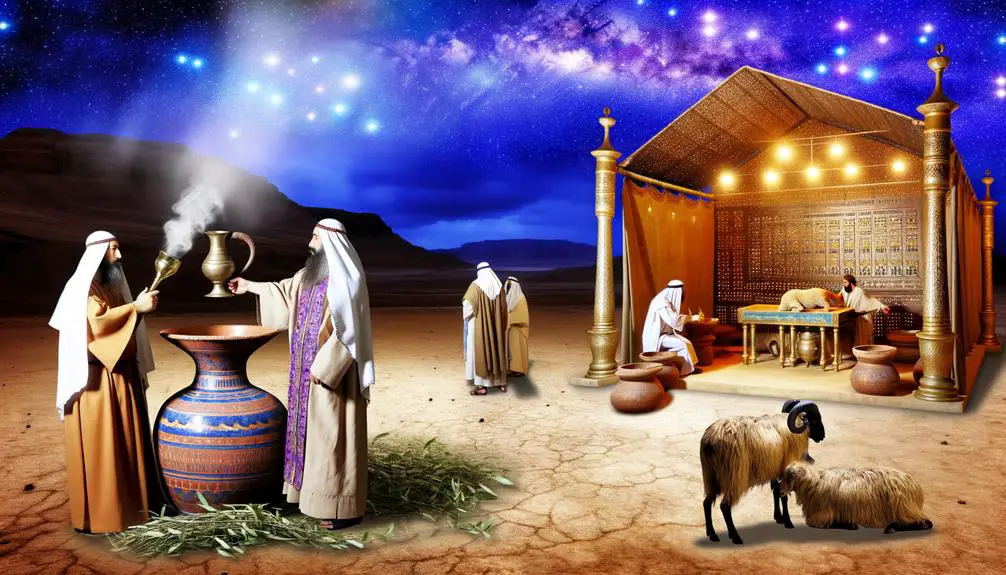
In the tapestry of Old Testament rituals, unction served as a critical symbol of consecration and divine approval, distinguishing individuals and objects for sacred purposes. This anointing process, deeply rooted in ancient traditions, was a tangible expression of setting apart chosen people and items for God's exclusive service. The use of oil in these ceremonies wasn't merely a formality but a profound act imbuing the anointed with a sacred status and divine blessing.
The significance of unction in these rituals can't be understated. When you delve deeper, you uncover its intricate role in:
- Priestly Garments: The anointing of priestly garments underscored the sanctity and purity required for serving in God's presence. This act symbolized the transformation of ordinary attire into a holy vestment, capable of bearing the weight of divine service and intercession.
- Sacrificial Practices: Unction also played a pivotal role in sacrificial ceremonies. By anointing the altar and the sacrificial offerings, the Israelites acknowledged God's sovereignty and sought reconciliation. This ritual purification signified the transference of sin and impurity from the people to the sacrificial victim, facilitating atonement and divine communion.
- Consecration of Kings and Prophets: The anointing of kings and prophets signified God's selection and empowerment. This unction marked them as divinely chosen leaders, endowed with authority and the Spirit of God to guide, protect, and prophesy to the nation.
Analyzing these practices reveals the profound theological and symbolic dimensions of unction in the Old Testament. It wasn't just about the physical act but the deep spiritual significance it carried, marking moments of divine favor and purpose.
New Testament Perspectives
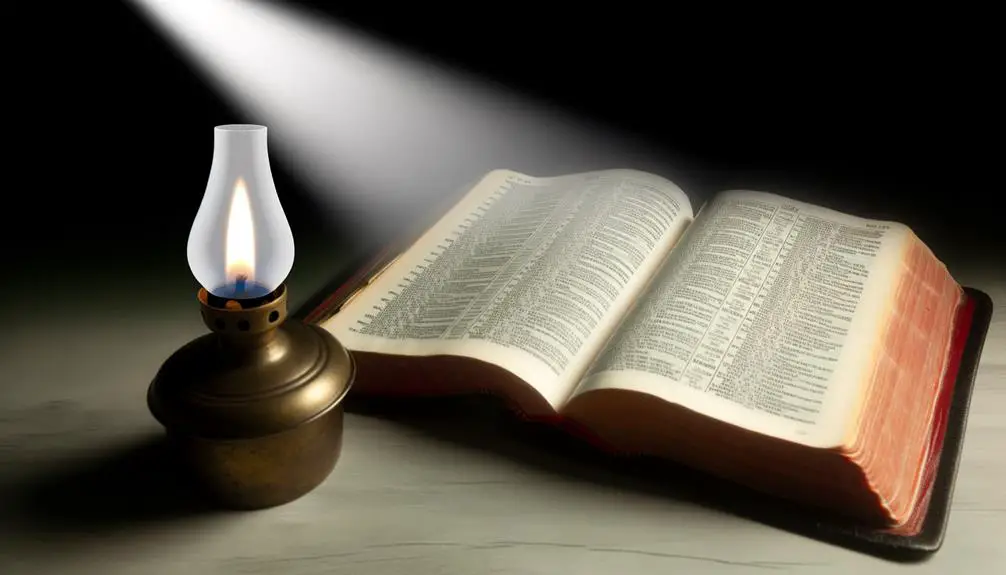
Shifting our focus to the New Testament, we find that unction takes on a nuanced and spiritually enriched dimension, reflecting its pivotal role in Christian doctrine and practice. Here, unction isn't merely an act of consecration but becomes a symbol of the Holy Spirit's anointing, pivotal for both individual and communal faith. This shift underscores a broader theological framework, emphasizing inclusion and the spread of the Gospel beyond the Jewish community.
A key figure in this transition is the Apostle Paul, whose teachings and epistles significantly contributed to the understanding of Gentile inclusion in the early Christian church. Paul's discourse on unction underscores its importance not just as a ritual act but as a profound spiritual endowment, enabling believers to partake in the divine nature and mission.
Reference |
Aspect of Unction |
Significance |
|---|---|---|
Acts 10:38 |
Holy Spirit's anointing |
Demonstrates Jesus' divine appointment and mission |
2 Corinthians 1:21-22 |
God's anointing of believers |
Establishes believers in Christ, ensuring their inheritance |
1 John 2:20, 27 |
Anointing as teaching |
Empowers understanding and discernment in believers |
Romans 11:13-24 |
Paul's ministry to Gentiles |
Highlights unction's role in Gentile inclusion |
These passages collectively reveal a profound evolution in the concept of unction from the Old to the New Testament. It emerges not only as a physical anointment but also as a spiritual empowering, indicative of God's presence and active involvement in the lives of believers. Furthermore, through Paul's ministry, unction becomes a bridge, facilitating the inclusion of Gentiles into the Christian faith, thus broadening the scope of divine fellowship.
Unction's Role in Healing
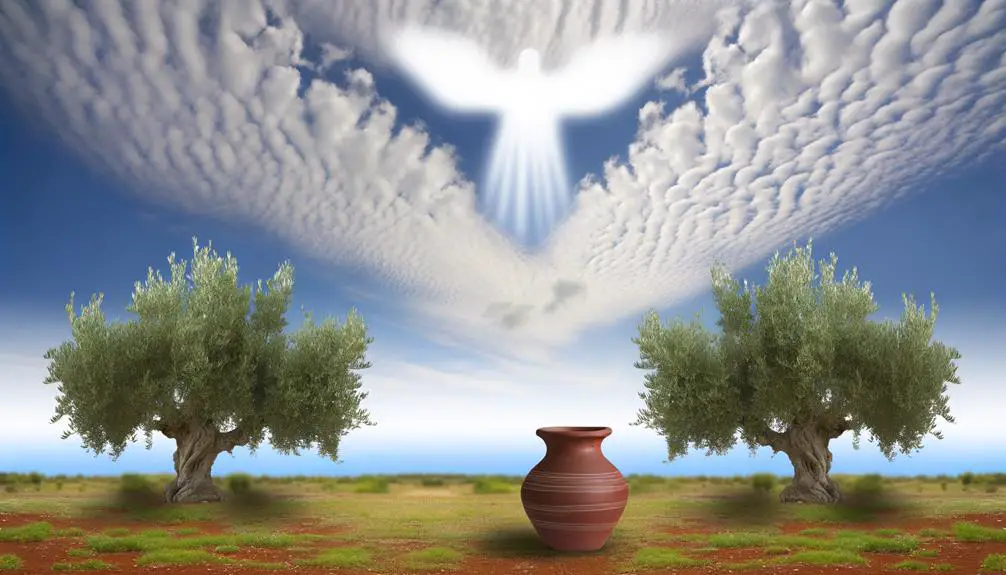
Delving into the New Testament, one discovers that unction's role in healing isn't just a mere act of physical restoration but a profound manifestation of divine grace and power. This ancient practice, where the sick were anointed with oil as a symbol of God's healing, transcends mere ritual to embody a deeper, spiritual healing. The act of anointing, therefore, becomes a conduit through which the divine interacts with the human, offering not just physical healing but spiritual restoration and wholeness.
To grasp the depth of unction's role in healing, consider these crucial aspects:
- The Symbolism of Oil: In biblical times, oil wasn't just a physical substance but carried rich symbolic meanings of joy, healing, and the presence of the Holy Spirit. The act of anointing with oil in healing contexts thus serves as a tangible sign of God's presence and power in the believer's life.
- Community and Faith: Healing through unction was never a solitary act; it involved the community of faith, embodying the collective prayer and support of the church. This communal aspect highlights the interconnectedness of the body of Christ in the healing process.
- Modern Applications and Cultural Interpretations: While the practice of unction has evolved, its core significance remains. Today, its application and interpretation can vary widely across different Christian traditions and cultures, reflecting a rich tapestry of faith expressions while maintaining its foundational role as a means of divine healing.
Analyzing unction in this light offers profound insights into its enduring significance, bridging ancient traditions with modern applications and cultural interpretations.
Experiencing Unction Today

Today, one encounters the practice of unction not as a relic of the past but as a vibrant expression of faith that transcends denominational boundaries and cultural divides. This contemporary engagement with unction isn't merely a ritualistic echo but a profound experience that integrates modern applications with deep, personal reflections. You might observe its presence in varied contexts, from solemn church ceremonies to intimate prayer groups, illustrating its adaptability and enduring relevance.
In analyzing its modern applications, it's essential to recognize how unction serves as a bridge between the divine and the mundane. You're invited to see it as a conduit for spiritual empowerment, enabling believers to navigate life's challenges with a renewed sense of purpose and resilience. This dynamic interpretation encourages a more personal and communal engagement with faith, fostering environments where personal reflections and spiritual growth are nurtured.
Moreover, experiencing unction today prompts a reevaluation of one's spiritual journey, inviting a deeper introspection into how divine grace manifests in daily life. It's a process that encourages you to ponder the significance of being anointed, not in a historical or abstract sense, but as a lived reality that shapes one's identity and actions in the world.
Ultimately, the practice of unction in contemporary settings underscores the timeless appeal of seeking and recognizing the sacred within the profane. It challenges you to consider how ancient traditions can offer profound insights and spiritual sustenance in the modern era, bridging the gap between past wisdom and present realities.
Frequently Asked Questions
How Does the Concept of Unction Differ Between Various Christian Denominations and Traditions?
In exploring how unction varies across Christian denominations, you'll find differences in anointing rituals and perceptions of spiritual empowerment.
While some traditions emphasize unction as a sacrament for healing and consecration, others view it as a symbolic act of receiving the Holy Spirit.
This divergence reflects broader theological interpretations and practices.
Analyzing these variations provides insight into how each tradition uniquely interprets and implements the concept of divine anointing within their spiritual framework.
Can Unction Be Considered Equivalent to or Distinct From Ordination in Different Christian Theological Perspectives?
Isn't it fascinating how spiritual empowerment intersects with clergy consecration across Christian theology?
When you dive into the debate, you'll find that unction and ordination aren't always seen as equivalent.
In some traditions, unction serves as a distinct spiritual anointing, separate from the formal process of becoming clergy.
This distinction highlights the nuanced approaches to divine calling and leadership within the church, revealing a rich tapestry of belief and practice.
In What Ways Has the Interpretation of Unction Evolved in Modern Christian Theology Outside of Traditional Biblical Contexts?
In modern Christian theology, the interpretation of unction has broadened significantly. It's no longer confined to traditional rites; instead, you'll find it embodies spiritual empowerment in diverse contexts.
This evolution reflects a shift towards personal faith experiences, highlighting how believers can harness unction for modern applications. The concept has grown to encapsulate guidance, healing, and an enhanced connection with the divine, adapting to contemporary spiritual needs and practices.
Are There Any Documented Instances Where Unction Has Been Controversial or Debated Within the Church's History Outside of the Provided Sections?
Imagine stepping into a centuries-old cathedral, where whispers of past debates echo off the walls.
You've asked if there are any documented instances where the practice of anointing, specifically its ethics, sparked controversy. Indeed, history is ripe with such instances.
Historical controversies around anointing have often stemmed from differing interpretations of its purpose and application, leading scholars and church leaders into intricate debates that have shaped the practice's evolution.
How Do Non-Christian Religions or Belief Systems View or Parallel the Concept of Unction, if at All?
You'll find that non-Christian religions have concepts paralleling unction. In Islamic Tasawwuf, the idea of spiritual anointing through Sufi practices mirrors the transformative essence of unction.
Similarly, Hinduism's Abhisheka ritual, involving the ceremonial pouring of liquids over a deity, echoes the sanctifying intention behind unction.
These parallels showcase a universal pursuit of divine connection and spiritual sanctification, transcending the boundaries of individual religious traditions.
Conclusion
As you've journeyed through the rich tapestry of unction's meaning in the Bible, you've uncovered its deep roots in divine anointment and spiritual empowerment.
Unction serves as the golden thread interweaving human experience with the Holy Spirit's transformative power. In both testamentary soils, it blossoms as a symbol of consecration, healing, and divine favor.
Today, experiencing unction is akin to feeling the warm, invigorating sunlight after a long night, guiding believers towards spiritual rejuvenation and purposeful living.



Sign up